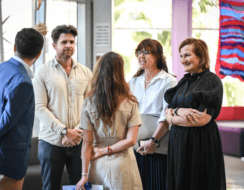30 Oct 2014
NewsWomen at Risk gain skills for a safe start
Humanitarian entrants who come to Australia on Women at Risk (WaR) visas are among the most vulnerable of refugees. They have been displaced from their homes and have experienced or been in danger of abuse, harassment and victimisation because of their gender.
These women are often also single mothers.
Settlement Services International (SSI) is the largest humanitarian settlement service in NSW and provides support services, including essential orientation and life skills, to 1,000 Women at Risk now living in Sydney.
Like all refugees and people seeking asylum, these women and children face various challenges and barriers when moving to a foreign country and culture. These barriers are often compounded by on-going physical and mental health issues created by the often-traumatic experiences they have been through.
During the recent school holidays, SSI’s WaR committee organised a practical orientation session with about 40 female clients and children going on a day trip to the city. Highlights included Customs House, the Opera House and a picnic lunch in the Botanical Gardens.
SSI CEO, Violet Roumeliotis said the women really enjoyed spending time with each other and their children in a relaxed and friendly atmosphere.
“Many of these women experience isolation due to language barriers, mental health issues, and being the sole provider and carer for their family,” said Ms Roumeliotis.
“Refugee women in Australia under the Woman at Risk visa category experience higher levels of post-traumatic stress and face greater challenges in resettlement. SSI supports these women with specialised care and case management and works with services and government to highlight their particular needs, especially in the areas of employment, affordable housing, health and education.”
On the day trip, women and children were accompanied by SSI case managers and were taught how to read train timetables, to use train stations and to purchase tickets. The outing was also an opportunity for the women, who were from a variety of language backgrounds that included Arabic, Assyrian, Farsi and Dari, to practice their English with each other.



